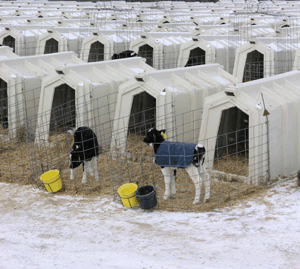A commonly occurring question from dairy producers is: How can we adjust our management practices to accommodate extreme temperatures so we can keep our calves healthy and growing in the winter months?
"As temperatures begin to decrease, the energy maintenance requirements of calves and heifers increase. In order for growth to occur these additional energy needs must be met," says Devin Hyde, a calf and heifer specialist with Purina Animal Nutrition.

Cold stress in calves occurs when temperatures fall below 60 degrees for calves under 21 days of age and 42 degrees for calves over 21 days of age. "But when it's 30 degrees F, calves will need 30 percent more energy just for maintenance," notes Hyde. "Energy requirements only go up the colder it gets."
Hyde shares the following five tips to help manage cold-stressed calves.
1. Bedding management. Bedding provides a method for the calf to reduce heat loss and is a source of insulation. An adequate bedding nest can help decrease the incidence of respiratory disease, as calves are able to use energy to maintain their immune systems instead of expending fat reserves to support body heat regulation.
2. Feeding three times per day. Research has shown that feeding milk replacer three times per day will help stabilize the pH in the rumen of the calf for better feed efficiency. Increased starter intakes and increases in total body volume are also key supporting outcomes of three times per day feeding.
3. Calf jackets. The use of clean, dry calf jackets has been shown to increase the internal temperature of a calf by 25 degrees F.
4. Giving free-choice water. Providing good quality water to calves is crucial not only for maintaining hydration status, but also for adequate rumen development. In the winter months, it is best to feed warm water soon after feedings so calves get used to drinking before they lie down and the water freezes.
5. Providing enough nutrition. Energy needs will be met by diverting resources from growth and body reserves. Plan your feeding program to provide the additional energy needed during cool weather periods. Implementing a calf starter that is formulated for supporting growth during the winter months is essential for consistent growth rates.
For more information contact your Purina Animal Nutrition representative or go to: www.amplicalf.com.
Purina Animal Nutrition LLC (www.purinamills.com) is a national organization serving producers, animal owners and their families through more than 4,700 local cooperatives, independent dealers and other large retailers across the United States. Driven by an uncompromising commitment to animal excellence, Purina Animal Nutrition is an industry innovator, offering America's leading brands of complete feeds, supplements, premixes, ingredients and specialty technologies for the livestock and lifestyle animal markets. Headquartered in Shoreview, Minn., Purina Animal Nutrition LLC is a wholly owned subsidiary of Land O'Lakes, Inc.
11.19.2012